-
 Bitcoin
Bitcoin $114400
0.68% -
 Ethereum
Ethereum $3550
2.48% -
 XRP
XRP $3.001
4.99% -
 Tether USDt
Tether USDt $0.9999
0.01% -
 BNB
BNB $757.6
1.46% -
 Solana
Solana $162.9
1.07% -
 USDC
USDC $0.9998
0.00% -
 TRON
TRON $0.3294
0.91% -
 Dogecoin
Dogecoin $0.2015
2.46% -
 Cardano
Cardano $0.7379
2.01% -
 Stellar
Stellar $0.4141
8.83% -
 Hyperliquid
Hyperliquid $37.83
-1.91% -
 Sui
Sui $3.454
0.76% -
 Chainlink
Chainlink $16.62
3.53% -
 Bitcoin Cash
Bitcoin Cash $554.6
2.84% -
 Hedera
Hedera $0.2486
3.91% -
 Ethena USDe
Ethena USDe $1.001
0.00% -
 Avalanche
Avalanche $21.95
3.34% -
 Toncoin
Toncoin $3.563
-2.85% -
 Litecoin
Litecoin $112.7
2.65% -
 UNUS SED LEO
UNUS SED LEO $8.977
0.13% -
 Shiba Inu
Shiba Inu $0.00001232
1.85% -
 Uniswap
Uniswap $9.319
2.93% -
 Polkadot
Polkadot $3.632
1.38% -
 Monero
Monero $307.2
2.36% -
 Dai
Dai $0.9997
-0.03% -
 Bitget Token
Bitget Token $4.340
0.91% -
 Pepe
Pepe $0.00001048
1.07% -
 Cronos
Cronos $0.1348
3.26% -
 Aave
Aave $261.5
1.93%
How to use stop-profit and stop-loss to manage risk?
Stop-loss orders automatically trigger asset sales to minimize losses when a predetermined price is reached, while stop-profit orders ensure gains by selling at a specific price.
Jan 08, 2025 at 07:31 am
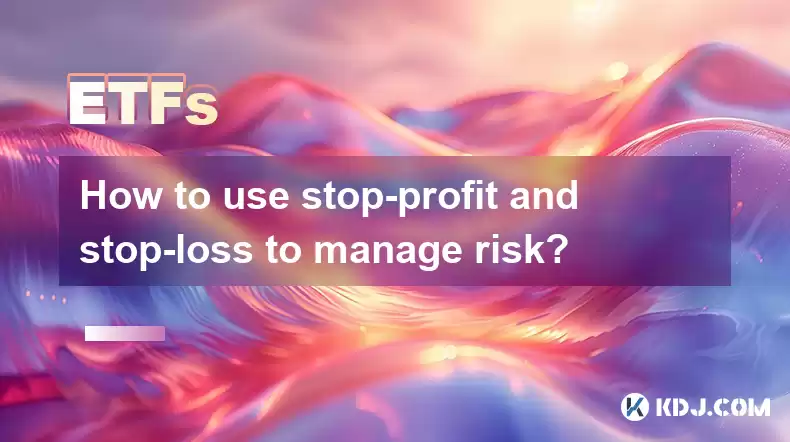
Key Points
- Understand the purpose and benefits of stop-profit and stop-loss orders
- Learn how to set appropriate stop-loss levels to minimize losses
- Discover strategies for using stop-profit orders to maximize gains
- Explore risk management techniques to protect your portfolio
- Identify the potential risks and limitations of stop-loss and stop-profit orders
Understanding Stop-Profit and Stop-Loss Orders
Stop-loss orders are designed to limit potential losses by automatically selling an asset when it reaches a predetermined price. They are useful for protecting your investments from significant downfalls and locking in profits.
Stop-profit orders, on the other hand, are used to take profits at a specific price. When the asset reaches the set price, the order is executed to sell the asset, ensuring that gains are realized.
Setting Appropriate Stop-Loss Levels
Determine the maximum loss you are willing to tolerate on a particular trade.
Analyze the asset's volatility and historical price movements to identify potential support levels.
Place the stop-loss order just below a critical support level or at a predetermined percentage below your entry price.
Monitor market conditions and adjust the stop-loss level if necessary.
Maximizing Gains with Stop-Profit Orders
Identify potential resistance levels where the asset is likely to face selling pressure.
Set the stop-profit order slightly above a resistance level or at a predetermined percentage above your entry price.
Move the stop-profit order upwards as the asset price increases to protect your gains.
Consider using trailing stop-loss orders that automatically adjust to follow price movements.
Risk Management Techniques
Use stop-loss orders in conjunction with other risk management strategies such as diversification and position sizing.
Consider combining stop-loss and take-profit orders to create a balanced risk management approach.
Regularly review your stop-loss and stop-profit levels to ensure they are still appropriate for the market conditions.
Monitor the volatility of the asset and adjust stop levels accordingly.
Risks and Limitations
Market slippage can occur, resulting in an order being executed at a price different from the set stop-loss or stop-profit price.
Stop-loss orders may be triggered by false breakouts or market fluctuations, leading to premature exits.
Stop-loss orders do not guarantee against losses but rather limit potential downside.
Market conditions can change rapidly, so constant monitoring and adjustment of stop levels is crucial.
FAQs
What is the difference between a stop-loss order and a market order?
A stop-loss order becomes a market order once it is triggered, meaning the asset will be sold at the best available market price.
Can I use stop-loss orders on all cryptocurrencies?
Stop-loss orders are generally available for cryptocurrencies with sufficient liquidity and actively traded on exchanges.
What is the optimal distance to place my stop-loss order?
The optimal distance varies depending on the asset's volatility and your risk tolerance. Typically, stop-loss orders are placed within a few percentage points below the entry price or at key support levels.
Can I modify my stop-loss or stop-profit orders after they are placed?
Yes, you can modify or cancel your stop-profit or stop-loss orders at any time before they are triggered.
What are the benefits of using stop-loss and stop-profit orders?
Stop-loss orders protect against significant losses, while stop-profit orders secure gains and prevent potential profit erosion due to market fluctuations. They provide peace of mind and allow traders to manage risk effectively.
Disclaimer:info@kdj.com
The information provided is not trading advice. kdj.com does not assume any responsibility for any investments made based on the information provided in this article. Cryptocurrencies are highly volatile and it is highly recommended that you invest with caution after thorough research!
If you believe that the content used on this website infringes your copyright, please contact us immediately (info@kdj.com) and we will delete it promptly.
- Cryptocurrency, Altcoins, and Profit Potential: Navigating the Wild West
- 2025-08-04 14:50:11
- Blue Gold & Crypto: Investing Disruption in Precious Metals
- 2025-08-04 14:30:11
- Japan, Metaplanet, and Bitcoin Acquisition: A New Era of Corporate Treasury?
- 2025-08-04 14:30:11
- Coinbase's Buy Rating & Bitcoin's Bold Future: A Canaccord Genuity Perspective
- 2025-08-04 14:50:11
- Coinbase's Buy Rating Maintained by Rosenblatt Securities: A Deep Dive
- 2025-08-04 14:55:11
- Cryptos, Strategic Choices, High Returns: Navigating the Meme Coin Mania
- 2025-08-04 14:55:11
Related knowledge
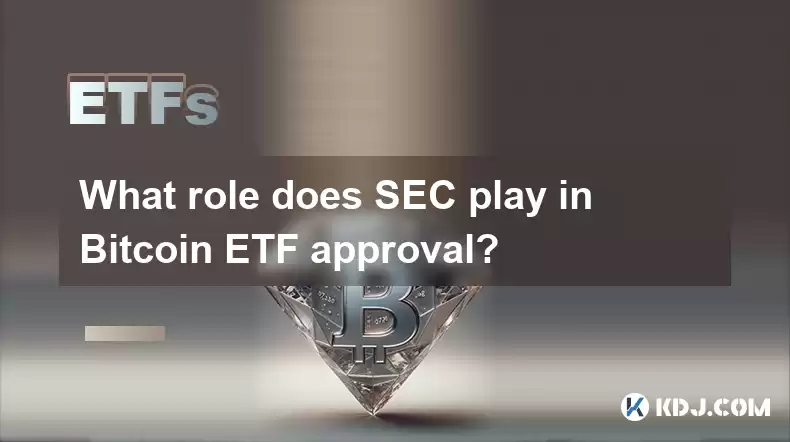
What role does SEC play in Bitcoin ETF approval?
Feb 25,2025 at 06:48am
Key Points:SEC's Role in Bitcoin ETF Approval ProcessHistorical Efforts to Establish a Bitcoin ETFSEC's Criteria for Bitcoin ETF ApprovalPotential Imp...
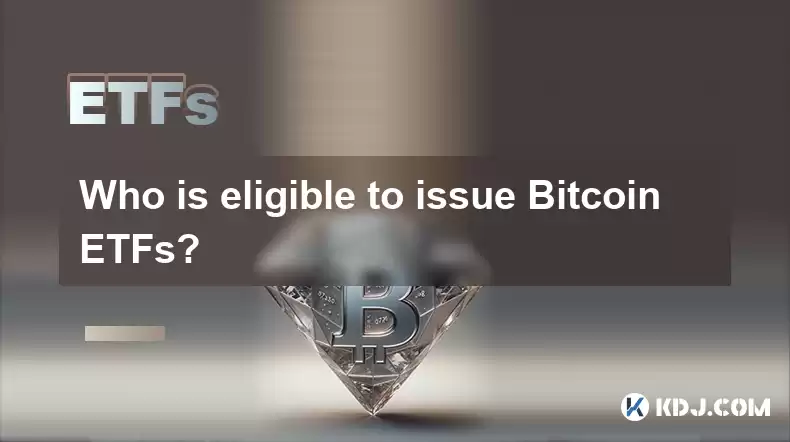
Who is eligible to issue Bitcoin ETFs?
Feb 25,2025 at 11:13am
Key Points:Only regulated financial institutions with the necessary expertise and infrastructure are eligible to issue Bitcoin ETFs.The Securities and...
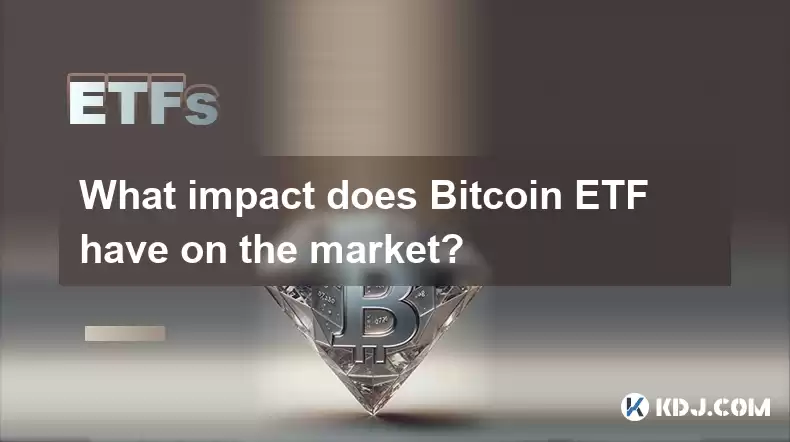
What impact does Bitcoin ETF have on the market?
Feb 25,2025 at 11:37am
Key Points:Introduction to Bitcoin ETFs and their role in the cryptocurrency marketHistorical development and performance of Bitcoin ETFsPotential ben...
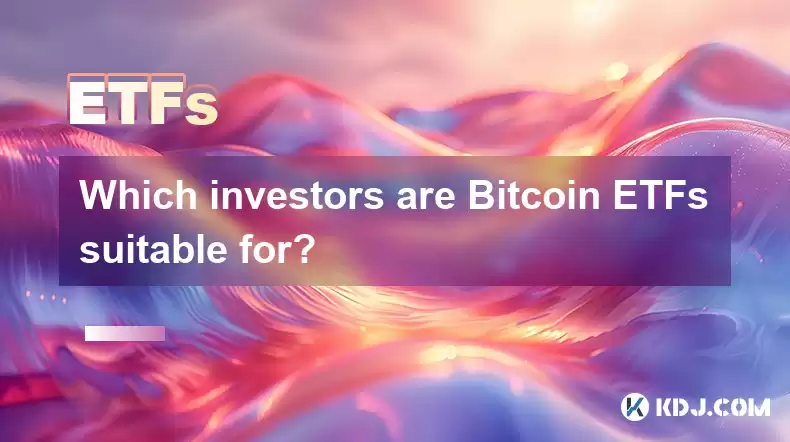
Which investors are Bitcoin ETFs suitable for?
Feb 27,2025 at 04:01pm
Key Points:Understanding Bitcoin ETFsBenefits of Bitcoin ETFsSuitability of Bitcoin ETFs for Different InvestorsAssessing Risk Tolerance and Investmen...
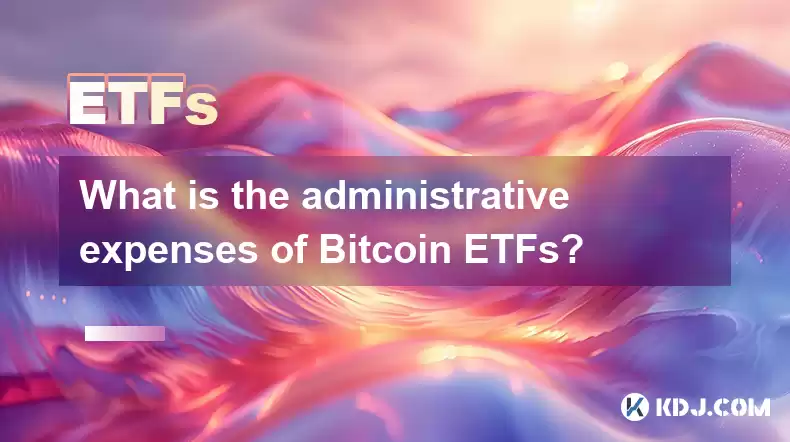
What is the administrative expenses of Bitcoin ETFs?
Feb 26,2025 at 12:24am
Key Points:Administrative expenses are a crucial factor to consider when evaluating Bitcoin ETFs.These expenses can significantly impact the performan...
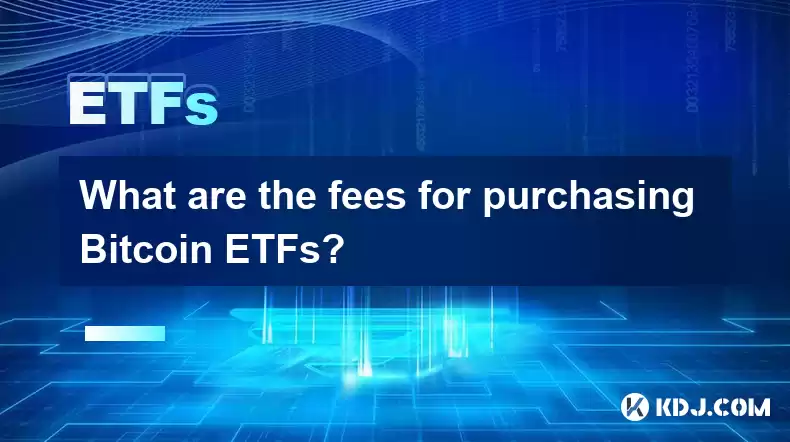
What are the fees for purchasing Bitcoin ETFs?
Feb 27,2025 at 07:13pm
Key Points:Bitcoin exchange-traded funds (ETFs) are a cost-effective and regulated way to gain exposure to Bitcoin.Fees associated with Bitcoin ETF pu...

What role does SEC play in Bitcoin ETF approval?
Feb 25,2025 at 06:48am
Key Points:SEC's Role in Bitcoin ETF Approval ProcessHistorical Efforts to Establish a Bitcoin ETFSEC's Criteria for Bitcoin ETF ApprovalPotential Imp...

Who is eligible to issue Bitcoin ETFs?
Feb 25,2025 at 11:13am
Key Points:Only regulated financial institutions with the necessary expertise and infrastructure are eligible to issue Bitcoin ETFs.The Securities and...

What impact does Bitcoin ETF have on the market?
Feb 25,2025 at 11:37am
Key Points:Introduction to Bitcoin ETFs and their role in the cryptocurrency marketHistorical development and performance of Bitcoin ETFsPotential ben...

Which investors are Bitcoin ETFs suitable for?
Feb 27,2025 at 04:01pm
Key Points:Understanding Bitcoin ETFsBenefits of Bitcoin ETFsSuitability of Bitcoin ETFs for Different InvestorsAssessing Risk Tolerance and Investmen...

What is the administrative expenses of Bitcoin ETFs?
Feb 26,2025 at 12:24am
Key Points:Administrative expenses are a crucial factor to consider when evaluating Bitcoin ETFs.These expenses can significantly impact the performan...

What are the fees for purchasing Bitcoin ETFs?
Feb 27,2025 at 07:13pm
Key Points:Bitcoin exchange-traded funds (ETFs) are a cost-effective and regulated way to gain exposure to Bitcoin.Fees associated with Bitcoin ETF pu...
See all articles

























































































